Mastering Link Building: Strategies and Insights
If link building weren’t hard work, we would all be ranking on the first pages of Google, right? Acquiring high-quality backlinks is difficult, but the rewards including increased brand awareness, new potential leads, and valuable connections are well worth it.

Instead of looking for shortcuts, it’s time to build a solid link building strategy which brings you actual results: boosted search traffic can put your business in the fast lane to success.
We’ve tried almost all white hat techniques out there, and after months of experiments, we’ve decided to share what we’ve learned. So, if you are looking for the proven techniques that actually work and can be replicated to your link building strategy, say hi to us, you are in the right place.
Why link building?
When Nightwatch was just starting out, we were heavily focusing on product development, not marketing. This, of course, proved to be unhealthy as the time passed by, and eventually, we’ve decided to balance it out by investing more resources into the latter. What has become our main focus?
Improving our search visibility by building links.
A few months later, our small marketing team had their hands full of work dealing with influencers, outreach emails, backlink exchanges, finding competitor backlinks to replicate and writing articles.
In less than a year, our search traffic tripled, Nightwatch has been listed as one of the best SEO tools available on the market, and our users’ base has been steadily growing ever since.

When we started to brainstorm our link building strategy, we knew that even with our limited resources we had to experiment and eventually stick with tactics bringing us best, tangible results.
Here’s the good news: each strategy can be replicated to your blog, no matter the niche. We’ve described the why, how, and what of each of them and shared our tips on how to approach them to achieve the most significant impact in the most efficient way.
So, take a look at our most effective link building strategies of 2018 and learn how to use them for yourself:
Outreach
Reaching out to bloggers, influencers, and relevant websites sums up to around 70% of all our link building efforts. We’ve literally turned our small, remote marketing team into a high-performing outreach machine, and for a reason.
Outreach is a great way to connect with bloggers and influencers, and despite what skeptics say, sending emails still seems to have the highest ROI. Naturally, we gave cold email outreach a try, and here are the results it brought us, ranging from the most to the least fruitful techniques.
Guest posting
Writing articles for other blogs, especially those with high domain authority (DA) is a neat strategy which search engines are willing to reward. Guest posting is a fairly common practice which brings you not only a valuable backlink but also an increased brand awareness, connections, and recognition as an expert in the industry.
It does take effort, resilience, and a creative mind. If we can sell you our tip here, that would be: experiment with your guest posts pitch and outreach method!
It took us a while to master our pitch, and we did not limit ourselves to emails. We’ve also used Twitter DMs and LinkedIn to build connections and reach out to potentially interested bloggers. And it worked like a miracle, so you might want to consider adding it to your outreach strategy, too.
To learn more about creating an effective guest blogging strategy make sure to read our article about acquiring 150+ high-authority backlinks in 8 months with blogger outreach.
Bonus: You can also download or copy our guest post content calendar template as well as our list of high DA marketing blogs accepting guest posts and add your own.
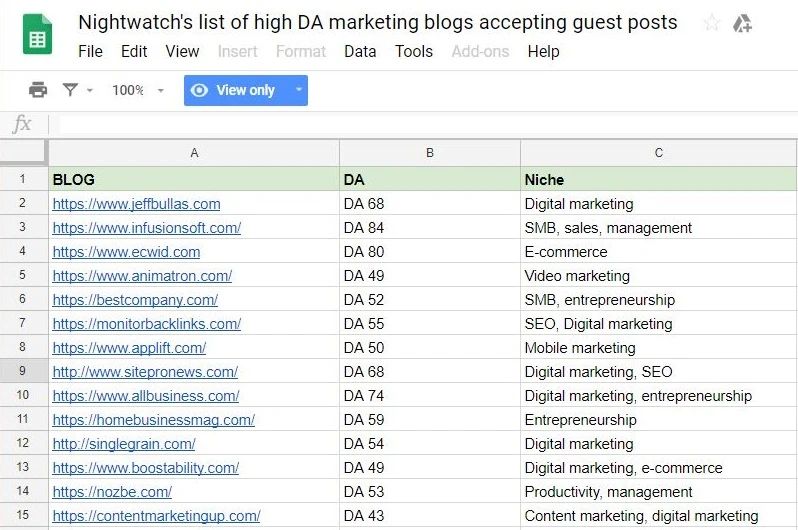
Roundups and quotes
Experts roundups and quotes requests are both great opportunities to help you acquire desired links. If approached in the right way, it’s a real win-win which brings in value for you, your readers and those who participated. Asking to be considered in the expert roundup or providing feedback or advice in someone’s else article is a relatively easy way to score a backlink.
Action steps:
- Research relevant roundups opportunities — use Zest.is, Twitter advanced search, and Facebook groups to find them.
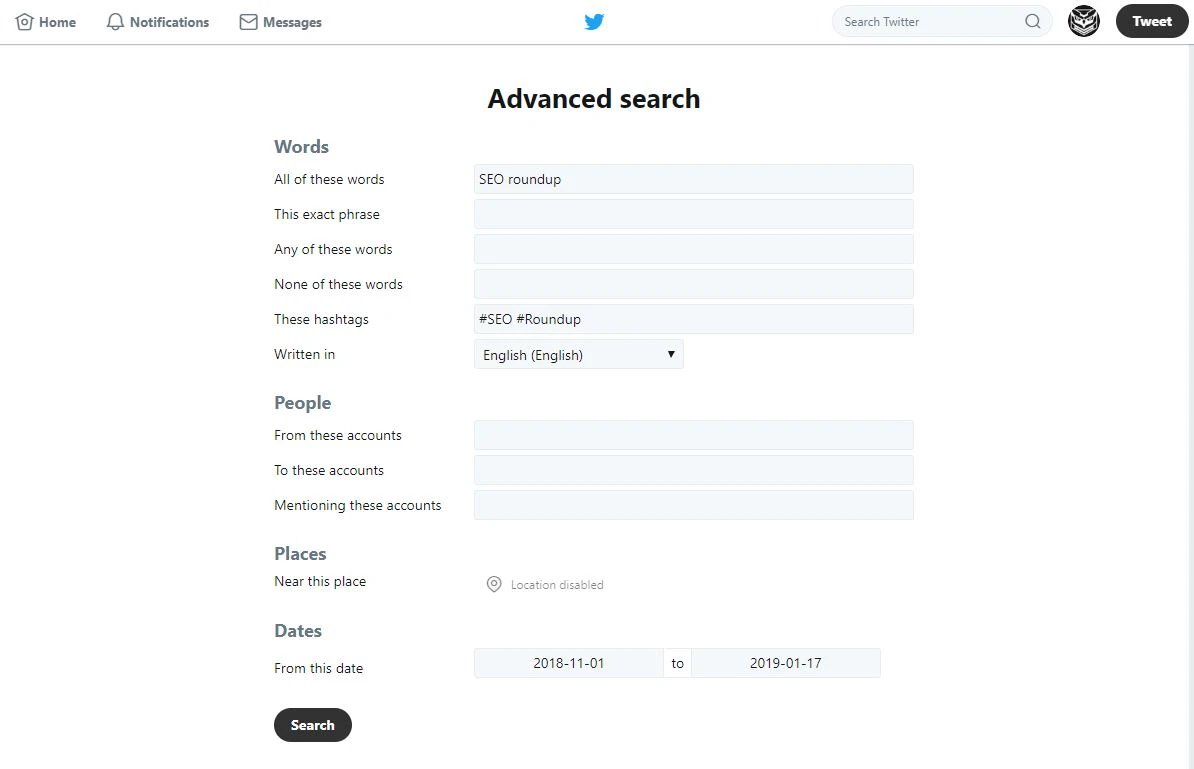
- Join bloggers communities, such as B2B Boost Bloggers and connect with members.
- Write a pitch highlighting why you should be considered to participate in a roundup.
- Send emails to the authors of existing roundups using Voila Norbert to find their address and ask to be included in the next one.
And that works both ways if you decide to publish a roundup on your blog.
Influencers and relevant to your niche experts often gladly share your piece and link to it in their own resources. Really, what’s a better way to boost your SEO and gain potentially huge brand exposure in one go?
Bonus tip: Get friendly and stay actively social. Experiment with collaborations. We’ve been doing it for a while now finding roundups opportunities using B2B Boost Bloggers, Twitter DMs, and email outreach.
Whether it’s the roundup you want to participate in or the one you create for your blog, make sure to aim for the win-win solution for everyone.
Backlink exchange
Who doesn’t love mutually benefiting collaborations?
Reaching out to bloggers in your niche who write content relevant to yours is merely being smart instead of competitive. This technique has helped us boost the search visibility of our blog.
The strategy we use is simple: each time we publish a new piece, we research similar or complementing articles and reach out to the author asking to include the link to our blog post. It’s often referred to as reciprocal marketing.
We do a thorough screening to check if their content would be a valuable resource that we can link to, and offer a backlink exchange or social mentions in exchange.
Bonus tip: Use Zest.is for researching the articles relevant to yours. In Zest, you can type in the keywords or browse through the articles in the chosen category, which makes it a fast way to find a bunch of relevant bloggers to reach out to.
Here are the blogs we could reach out to to promote our article about social listening, offering a links exchange.
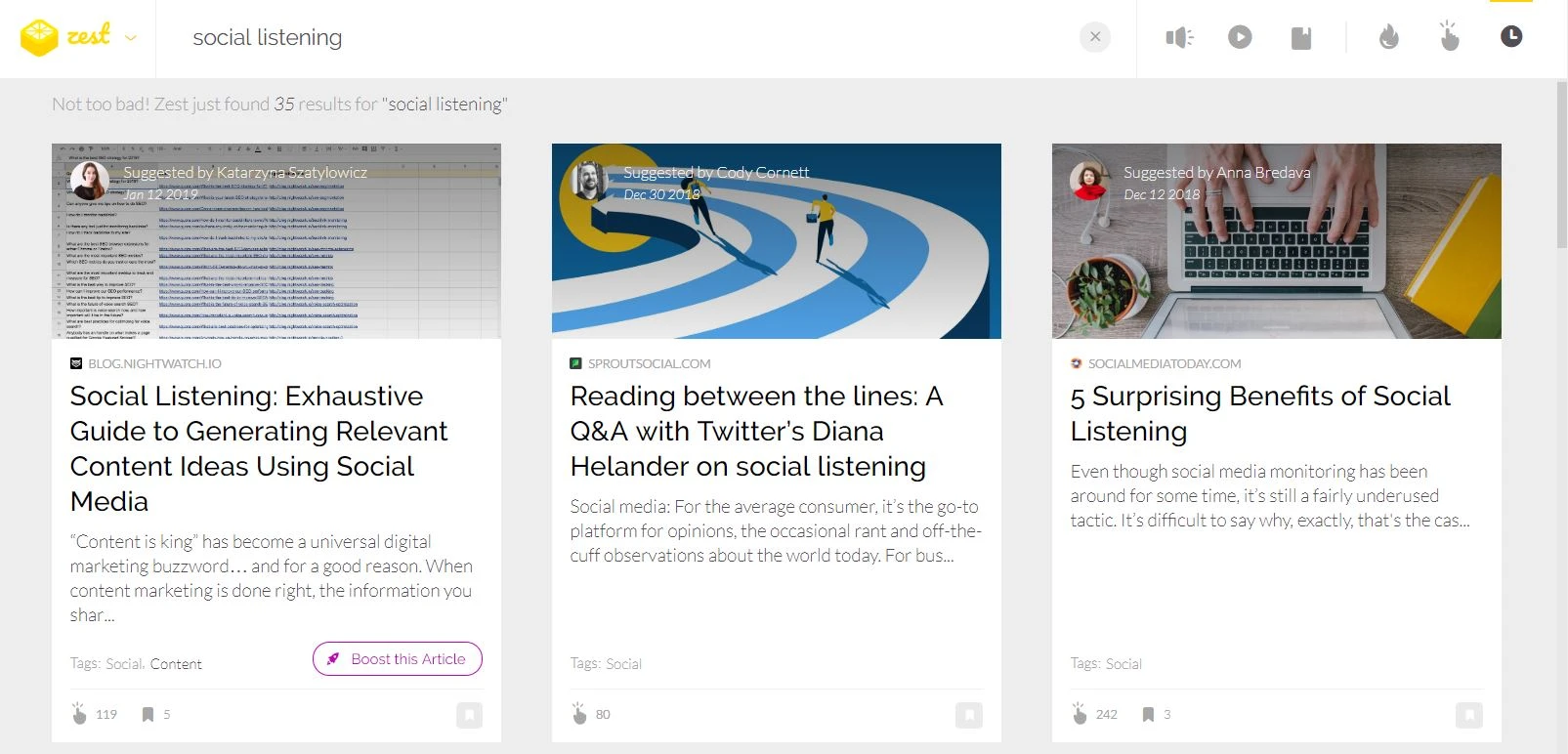
It seems better than Google because reaching out to the top results websites might often end up being a waste of time as the authors usually don’t have the right to edit their published work.
Action steps:
- Research similar or complementing articles to the one you’ve published.
- Do the screening to identify keywords you’d like your article to be linked under.
- Write the pitch offering a backlink exchange on your blog or social mentions. Include the screenshot of where you’d like your article to be linked.
- Follow up.
Influencer outreach
Influencers can become powerful allies if you find a way to approach and befriend them. And don’t be fooled thinking that it requires too much effort.
When we started the influencer outreach, we knew little, but one thing: we offer an exceptional product, and that Nightwatch can become their favorite SEO tool if they give it a go. So, the hard part was, obviously, making our offering so appealing that they couldn’t resist.
As with the guest posting, it took us months to master our pitch and start receiving replies. We’ve focused on two kinds of potential backlinks: getting Nightwatch on the SEO lists and acquiring reviews.
The process of acquiring such backlink seems simple, but it does require the right timing, patience, a pinch of creativity, and a great product to start with. Give it a go with the influencers or micro-influencers in your niche, because nothing works as good as having influential “walking advertisements” in the personas of your befriended influencers.
Action steps:
- Define your desired backlink form (tools list, reviews, etc.).
- Craft a compelling pitch offering VIP access to your product in exchange for a backlink or review.
- Follow up.
Bonus tip: If the cold email outreach doesn’t work, use re-purposing. What we mean is this: start building the relationships with chosen influencers in alternative ways: follow their social media profiles, engage with their content, show appreciation for their work.
We did that using our Twitter account, and it worked better than expected! Try it out and make sure to measure your progress and adjust your influencer strategy.
Jobs listings
This was a relatively spontaneous idea which can be replicated in any niche. As a fully remote team, we are a part of the “work and travel” or “work from home” trend, and we’ve decided to use it to our advantage.
After researching the articles titled: “X Best Remote Company to Work For” and free jobs listings, we’ve reached out to those websites and asked to be included. Guess what?
The authors, who often are influencers themselves (digital nomads and travelers), were more than pleased to add yet one more company to their lists.

Why?
Because some of them live off researching remote companies offering jobs, gathering those and passing this information over to their audience, often remote job seekers.
No matter your niche, try it out and research the companies lists and articles where your business could be included. It’s an easy and relatively fast way to get a free backlink to your landing page!
Action steps:
- Research jobs listings and articles about jobs in your industry.
- Create a pitch asking for inclusion on the list, or mention in the article.
- Follow up.
Bonus tip: Figure out what makes your company special (for us it’s being fully remote), and leverage this strength to find places where you could write about it.
Link reclamation — unlinked mentions
Link reclamation does not have to be limited to fixing the broken links (which you can identify using Nightwatch for example). It relates to any opportunity where your brand or resource is mentioned and could be linked to, but is not.
Missing out on the opportunity to get a backlink for your brand where your business is already mentioned is like passing on the 5000 sales just because you forgot to include the “buy” button.
To understand and master how you can use link reclamation to your technique, you need the right tools. Our recent discovery — Brand24 has been a massive help in discovering new potential backlinks opportunities.
It’s a social listening tool which allows you to “access the mentions about your brand across the web, from social media to influential publishers.” You can monitor relevant keywords and spot the opportunities for a backlink.
With Brand24, we’ve identified the unlinked mentions to Nightwatch landing page, as well as discovered SEO-related forums and Twitter users who are talking about our tool. We’ve also taken advantage of monitoring certain keywords, such as “SEO tool” or “backlink tracker” to get an insight into the industry and our potential target audience.
Here’s how the dashboard looks like:
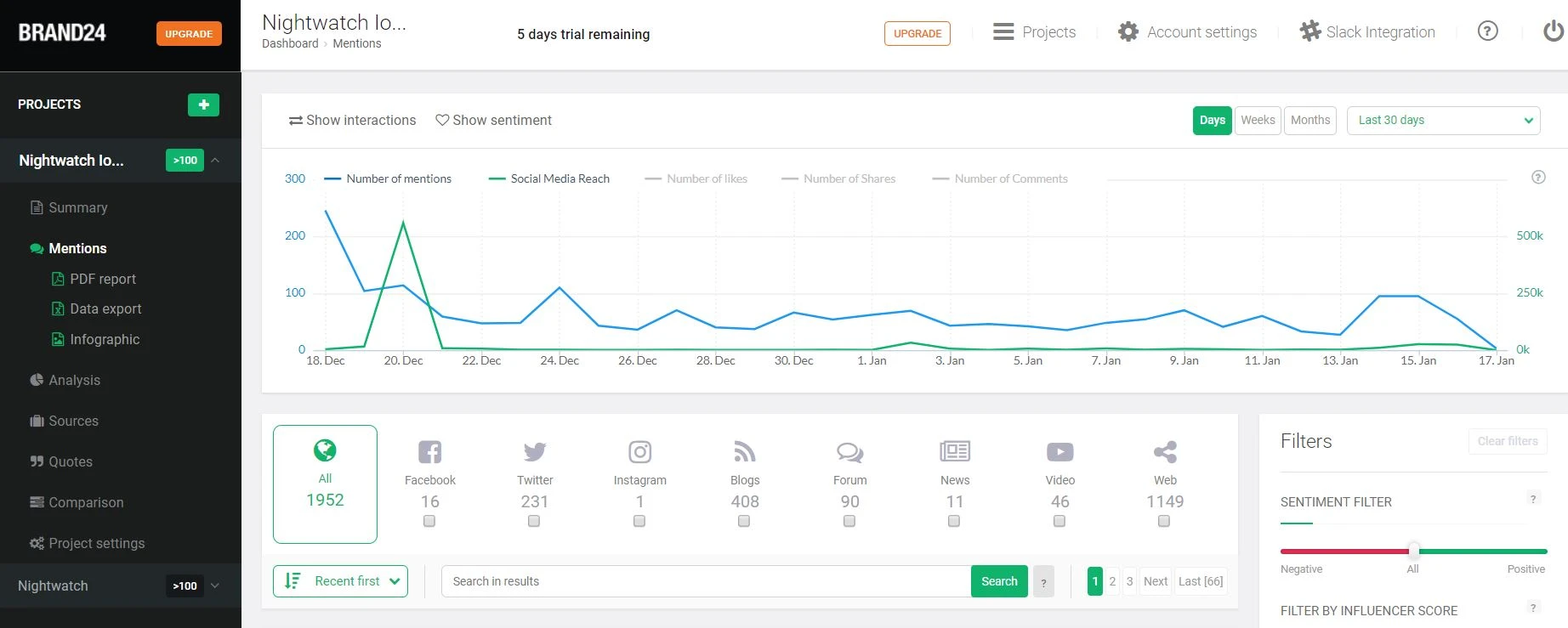
So if monitoring and “fixing” broken links seems daunting, start with monitoring your brand’s mentions and relevant keywords where you could ask the authors to link back to you. Easy enough, right?
Action steps:
- Start using a tool to monitor the SEO performance of your website, for example, Nightwatch, and a social listening tool, such as Brand24.
- Identify broken links on the external websites and reach out to owners to replace the link with the working one. And yes, you can do that in Nightwatch backlinks monitor.

- Start monitoring the keywords related to your brand. In our example, it could be “SEO tool” as well as your brand name. Then, ask the website’s owner to link to your page.
Bonus tip: After identifying broken links or unlinked mention try to connect with website owners before you reach out to them for a favor, for example, using social media.
Social media
Quora
Quora is a Q&A platform with a dedicated community built around it. Incorporating Quora into your SEO strategy can help you boost your search visibility if done right.
While it is true that Quora’s links are nofollow (you can link to your landing page and blog while answering a question), it still holds some value for your link building efforts. Nofollow links from Quora can serve as a diversification in your link profile, as acquiring solely dofollow links might look suspicious.
Additionally, this platform can become a juicy referral traffic source bringing you high-quality leads. Answering regularly to the topics in your niche and positioning yourself as an expert in the industry (read: being helpful!) is a brilliant way to gaining brand exposure, building connections, and referring the audience to your website or product.
And don’t forget — Quora can give you an insight into your audience’s problems and preferences. From our experience, it is a place well-worth investing the time and effort, as it has become a part of our lead generation strategy in the last few months:
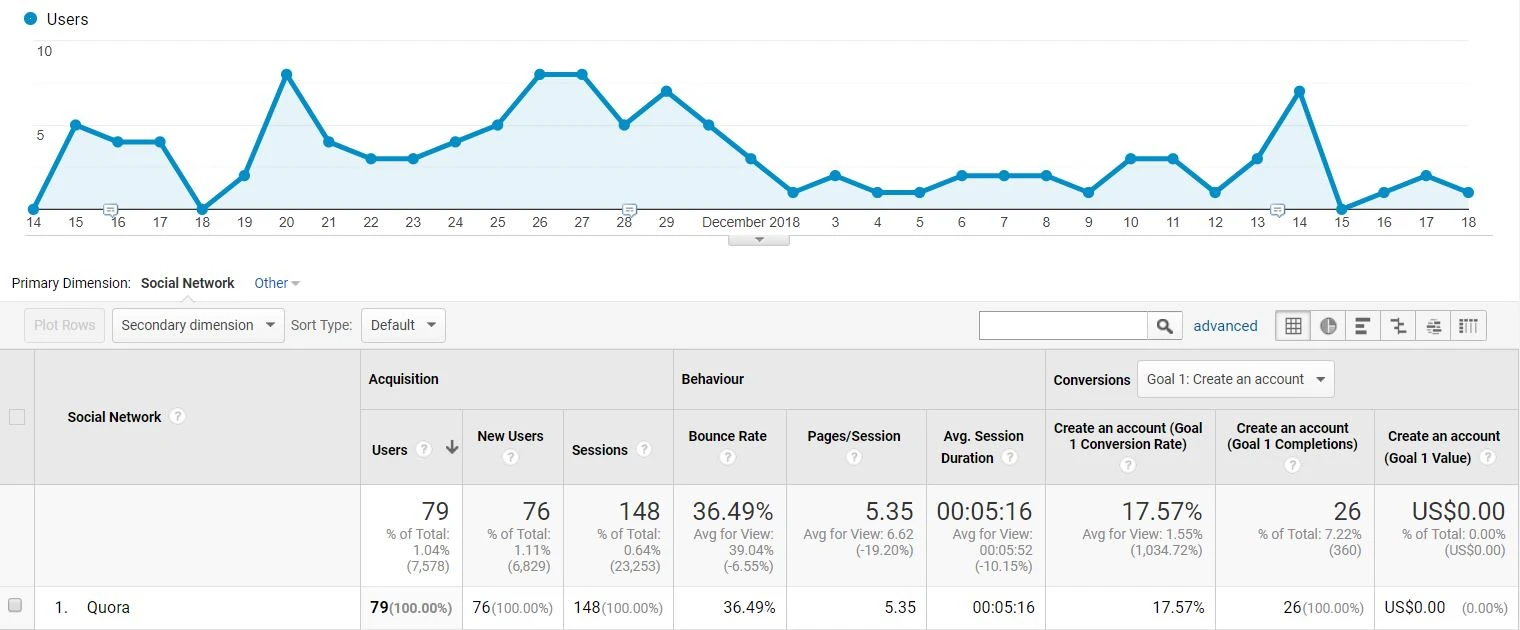
Twitter and Facebook
Even though a social media mention does not land you a backlink per se, using those platforms can serve as a great way to build a base for your link building strategy.
As mentioned before, Twitter and Facebook can help you:
- Identify potential backlink opportunities (roundup, finding bloggers and influencers in your niche)
- Build connections for guest posting and backlinks exchanges.
- Bring more traffic to your website and increase the brand exposure.
Even though Google said that social shares have no impact on search ranking, making your content more visible converts into boosted website traffic and engagement, which is the metric that Google does care about.
Bonus tip: Start using a social listening tool to monitor the discussions on social media where you could participate.
Comments
Disqus
The era of posting the comments with the link to your website anywhere possible and Google giving it the importance in your search rankings is, thank God, over. It seems like nobody misses spammy, irrelevant comments popping up under each of the published articles, and the marketers community got over it fast as the party was over.
Does it mean that comments have absolutely no value now?
This still seems to be rather a mystery, though nobody has doubts that blog commenting got labeled as a much less relevant SEO strategy than it used to be. Data shows that Google might be giving little importance to this user-generated content, but you could take advantage of it using the same way you would use social media: connecting with relevant people and identifying backlinks opportunities.
We particularly like to use Disqus, because it is stated to be crawlable (though the indexing is out of their hands), meaning potentially SEO-friendly. In addition, their system is easy to manage with a built-in spam filter, and it seems like it is widely used by many high-quality marketing-related blogs, so the commenting is fast and easy.
Bonus tip: Start tracking the blogs and the number of comments you write and use it later to connect with the bloggers using the outreach.
Measure ROI and adjust
As Peter Drucker famously said: “If it cannot be measured, it cannot be managed”: you need a system for measuring and adjusting your link building efforts.
Make sure to track your progress and cut the losses fast. We use a simple Excel sheet to track our outreach process, engagement via comments and social media, and Airtable for the backlink exchange. It doesn’t have to get more complicated than that.
The key is to identify the bottlenecks if you are stuck quickly. The common ones for us included a mediocre, unappealing pitch, without a good CTA and focusing on the wrong group of influencers, to begin with.
Start small, perhaps pitch lower DA blogs and build connections with micro-influencers first, and then move onto the bigger challenges.
Our system of measuring the progress is transparent and straightforward for everyone in the team: we started by defining our KPIs, then started using Excel to keep the list of blogs in one place and update it on a regular basis. We track our bigger projects and progress in the Airtable, and we also write weekly updates on our Slack channel.

Bonus tip: Make sure your KPIs are as specific as possible. Every step of your process should be easily measured.
Don’t
There have been as many myths about various link building techniques, and as the years pass, we can see which trends come and go.
Here at Nightwatch, we are committed to carrying out our marketing activities in an ethical way, and we advise other businesses to do the same.
Here are a few, popular black hat techniques which should be avoided at all costs and which can result in damaging your SEO:
Don’t buy links from shady outreach provider
This is not only unethical but also very risky for your website’s SEO performance. Buying links can end up in you losing your money and time — and receiving a severe Google’s penalty, as this practice is a violation of the Google’s Webmaster Guidelines. It’s tempting, but if you care about your website, we advise you to stay away and to focus on acquiring your links using white-hat techniques.
Don’t spam with comments
This is simply a waste of time and a practice which will not get you anywhere, other than the permanent banishment from the blogs you leave spam comments for. In fact, it’s a lose-lose situation for both parties — the blog you leave spam comments for might be penalized and if Google finds too many signature links to your website (the link you can sometimes leave when publishing a comment) coming from spam comments, it can harm your website, too. Leave only thoughtful and relevant comments which add value and help you build new connections.
Don’t cloak
Showing search engine different content than what your users see is just wrong. Sadly, it’s also fairly common. This practice is something that the search engines will eventually pick up, and your website’s SEO performance will suffer. The choice is yours, but ask yourself: is it worth it?
Expert advice
Finally, we’ve decided to ask experts about their favorite link building techniques and here’s what they said:
“In 2018 we focused on two things that yielded a lot of results for us. The first one was answering every relevant question we could find in Haro which landed us solid mentions on places like content marketing institute and G2Crowd.”
The other thing we did was good old-fashioned guest posting for high DA websites. The benefit of this strategic guest posting is that your content gets picked up across multiple websites, so you get two or three links for the effort of one.” — Daniel Ndukwu, Founder and CEO of Kyleads
“Our top link building tactics are:
- The B2B Bloggers Boost Group, and here’s why. Besides links, you develop long-term relationships which can — and will — lead to other opportunities such as co-marketing, partnerships, etc. It’s easier to get links to specific content on your site. Compared to other link building tactics, you are more in control of the context in which your brand and content is mentioned. This is important when you want to grow the topical authority of your site.
- Outreach to authors who mentioned competitors in their article. Here it is important that you give back more than you ask. We use below P.S. in our outreach emails and achieve an email-to-link ratio of 5%!”
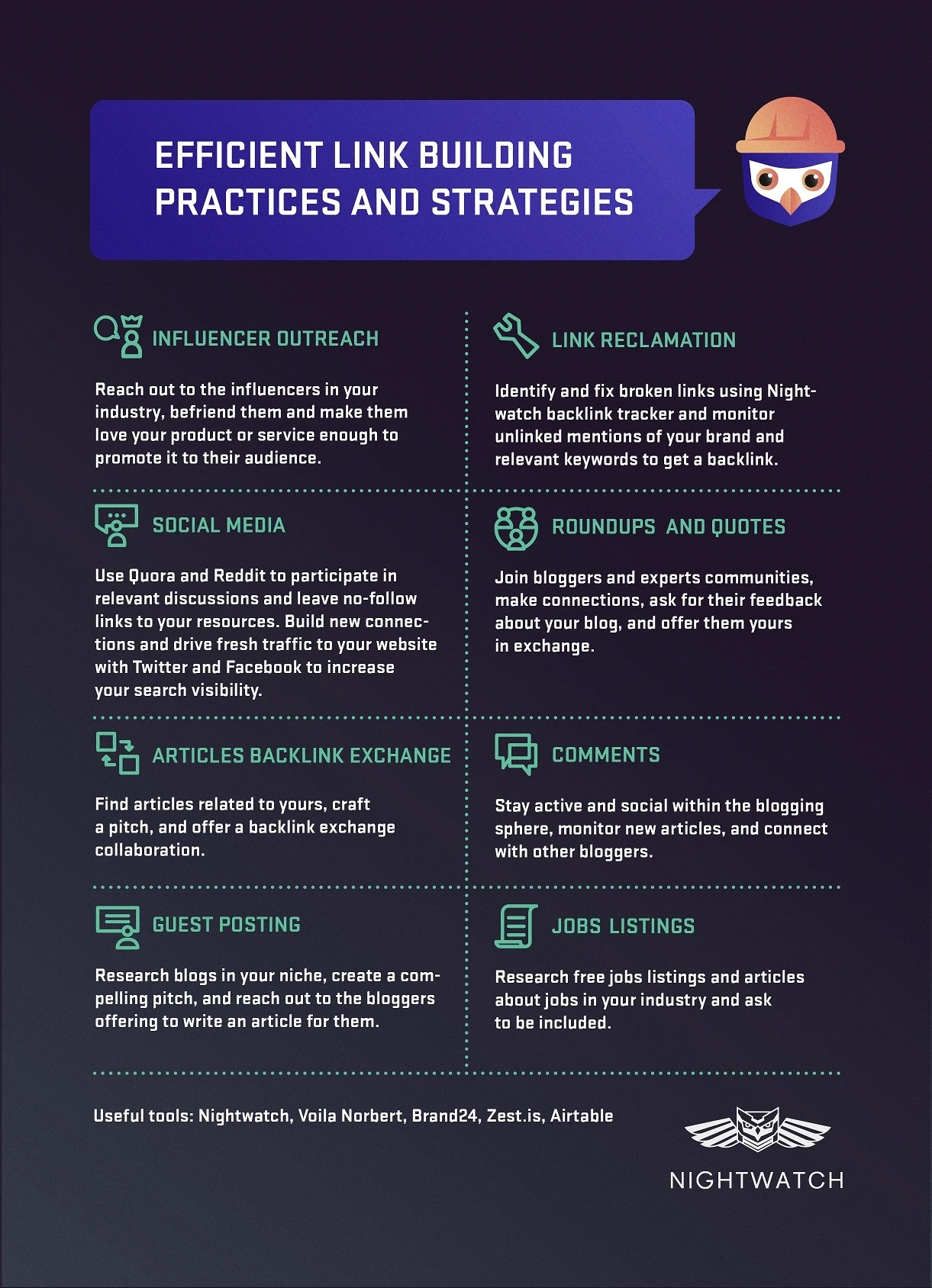
“We utilize a variety of link building methods to maintain a steady stream of diverse and natural inbound links. After merging with Volume Seo they advised us to launch a free Wordpress plugin that included links back to our site. This one tactic accounted for many of our new inbound links in 2018 and gave us a substantial increase in search engine traffic.” — Keller Tiemann from Leadsurance
“Our most effective link building strategy has been publishing original research studies. Original research is time-consuming and difficult to execute — and that’s exactly why it’s so valuable. Very few marketing teams conduct original research. Journalist love writing about new studies and bloggers often link to research to back up their claims. Last year we published a study about Google’s Medic algorithm update. So far it’s been one of our top performing blog posts and earned over 50 backlinks. The best part? It continually earns links over time as more companies cite the data in their content.” — Henry Butler, Director of Promotions at CanIRank.com
“The most scalable tactic we have used at AND CO from Fiverr is creating epic pieces of content featuring original data. Using large surveys or data from within our own product, we publish a piece of content and create a lot of buzz around it. These become highly quotable, and any time someone references the statistics from the report they need to reference where they found them. This has allowed us to grow links organically much faster than any link building we can do with outreach or guest posting.” — Sophie McAulay, Growth Strategist at AND CO from Fiverr
“The best link building tactic for us has been finding a business similar to our client’s that are no longer in business and then reaching out to the people who link to them. They are more than happy to replace the link!” — Shaurya Jain, Founder of Attention Always
“Value-based linked building has been a key focus area for authority and link building tactics that I’ve focused on over the past year. This stems from identifying your key target audience personas and matching their wants, needs and pain points with single click hubs/resources that provide comprehensive topical coverage. The more comprehensive the content hubs, the greater the social PR, natural backlinks, and ultimately authority/traffic and visibility delivered has been.” — Lee Wilson, Head of SEO at Vertical Leap
“One of my favorite techniques is finding niche relevant resource pages that list tons of great articles on them and pitching for your resource to them, or looking for broken links they can replace with your article. You can find these by using search operators like: “keyword” + intitle:resources and “keyword” + inurl:resources. Another good strategy is looking for content similar to yours that’s ranking on the 3rd page (and further) for your target keyword and reaching out about including your article as an additional resource. They’re more likely to link to it when they’ve proven they’re interested in the topic of your resource already.” — Hunter Branch, Founder of Rank Tree
“Publishing statistic and report-based content has proven to be very effective. I view this as an “evergreen link building strategy.” An example is our ‘customer review statistics’ piece where we round up all of the review statistics into one article. Another is our ‘2019 digital trends’ series where we focus on specific tech trends in verticals such as HR, retail, etc. People searching for HR trends, or customer review statistics, are looking for stats or sources for their own articles. These ‘link-bait articles’ are a great strategy for building links, as you just build the content and watch the links come in.” — Levi Olmstaed, Manager of Content and Community at G2 Crowd
“My most effective link building strategy is to leverage the guest posts I’m working on to generate new opportunities. When I’m writing a guest post I always try to include a link to content from a website I want to write for in the future. I’ll mix this up by asking for an insightful comment from someone from a suitable site to include in the article. Providing value before asking for anything in return works really well. I get a lot more responses from blog owners, and businesses using this strategy than I do from a cold guest post request. It’s an effective way to network.” — Nico Prins, the Founder of Launch Space
“Links pointing back to your website are still one of Google’s top ranking factors, and this was confirmed by Andrey Lipattsev the search quality senior strategist at Google in 2016. One of our favorite link building methods is creating roundup posts. This is done easily by reaching out to experts on a topic and asking for their quote or to make a small contribution based on their opinion or experience in return for a mention from your post. Any SEO expert who has actually implemented this method will tell you this works well and can help to rank for a super competitive keyword almost overnight. This is the ingredient that will help you get your visibility on search to new levels.” — Paul Granger, Content Writer at Website Promoter
“A successful link building strategy needs a diverse range of tactics. Of course we continue to find guest post opportunities but we’re placing more of our focus on quality and contextual link exchanges, expert roundups and contributing to podcasts. Link exchanges convert because if done well they provide value for both parties. Expert roundups more often than not lead to more and more link opportunities. Contributing to podcasts is a great way to earn links in shownotes, which will set you apart because the practice is not as widespread as guest posting - And with audio being introduced into the SERPs there may be even more advantage.” — Quentin Aisbett, Digital Strategist at OnQ Marketing
“Skyscraper technique is an amazing link building method. We look for content pieces that are extremely popular or trending on Google. The next step is to create an article that is just as high-quality as the original post. Ultimately, you end up attracting more backlinks by reaching out to the right blogs.” — Wilson Tiong, Internet Marketer at ADEL SEO
“Besides guest posting and link exchange with websites that are in our niche, we created interesting infographics. Our infographics added value to articles related to digital marketing trends, branding, and they were used on blogs of the best web design agencies out there. There are many tools to find the right places for offering such infographics and you can use it to find blogs that talk about those topics but don’t have infographics. With great outreach techniques, we persuaded important websites in our niche to link to DesignRush, and both sides were happy.” — Angelina Harper, Writer at Design Rush
Final thoughts
There are numerous link building techniques out there, but the real art lies in the ability to recognize and implement those which are most effective. Your approach to link building should be strategic and thoughtful.
Using one of the mentioned techniques will only make sense if you understand the importance of planning, tracking, measuring, and adjusting your strategy. Here they are one more time just in case:
- Guest posting
- Articles backlink exchange
- Influencer outreach
- Jobs listings
- Link reclamation
- Social media
- Comments

Our last advice is simple: experiment and stay patient. Link building is a long-term game, and you will eventually rip the benefits.
Share this article with your fellow marketers and outreach coordinators —and let us know what you think in the comments!
